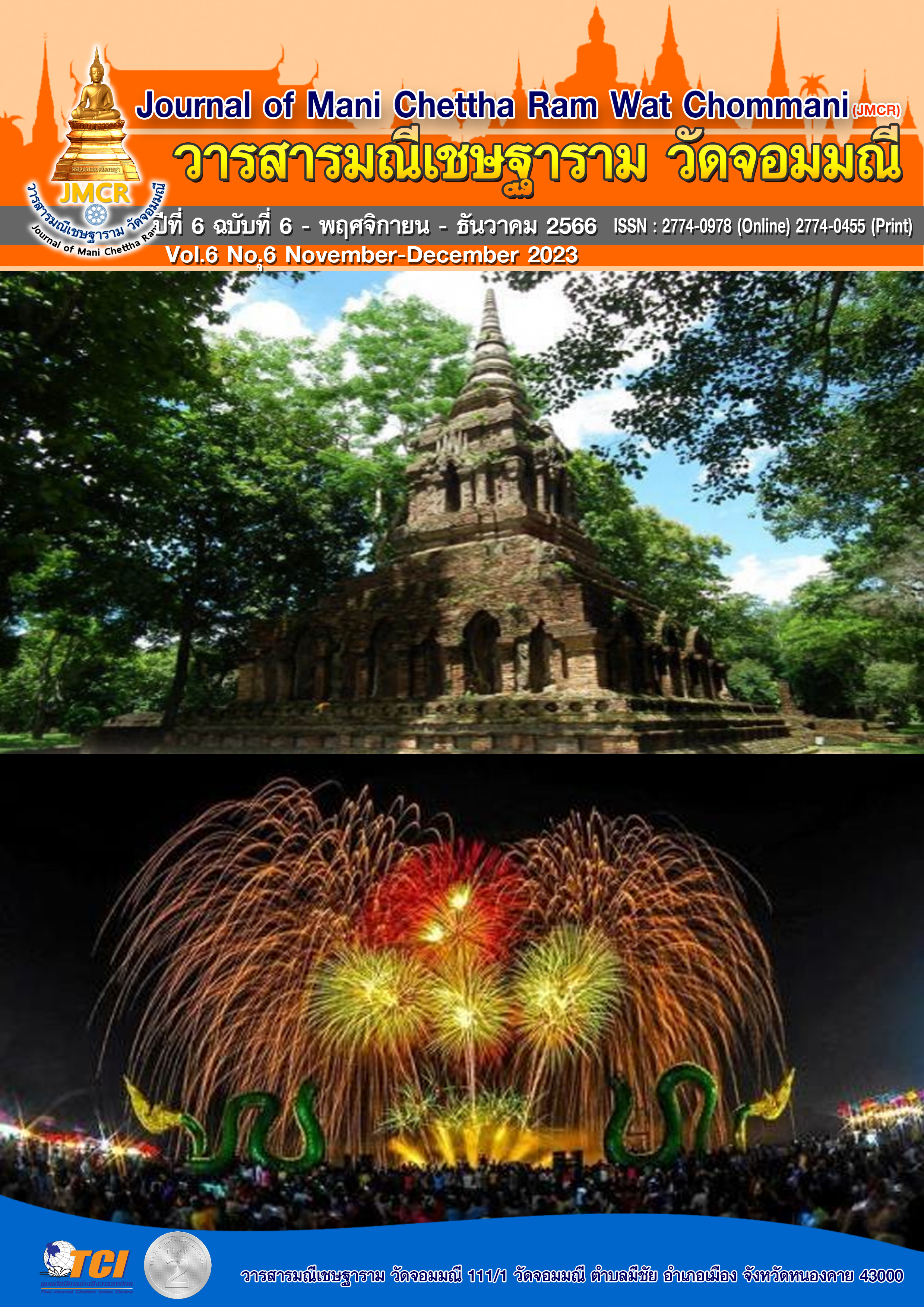FACTORS INFLUENCING THE DECISION TO BUY USED CARS IN THE SITUATION OF COVID-19 OF CONSUMERS IN BANGKOK METROPOLIS
Keywords:
Influence, Decision-Making, Used Cars, Situation of COVID-19Abstract
Economic problems that are beset and aggravated by the COVID-19 epidemic situation. The used car market has also been affected and is undergoing a major transition to cope with future changes. The objectives of this research were 1) to study the problems and obstacles of factors influencing the decision to buy used cars in the COVID-19 situation of consumers in Bangkok Metropolis, and 2) to study factors influencing the decision to buy used cars in the COVID-19 situation. of consumers in Bangkok Metropolis. The research model was qualitative. The key informants were used car entrepreneurs, consumer protection association, staff Department of Transportation and consumers in Bangkok Metropolis, totaling 20 people by purposive selection. The instrument for data collection was an interview. The data were analyzed using a descriptive summary method.
The results found that 1) the problems and obstacles of factors influencing the decision to buy used cars in the situation of COVID-19 of consumers in Bangkok Metropolis were situations COVID-19 had reduced the purchasing power of consumers. Financial institutions were strict in lending. Consumers increasingly preferred to buy products through online channels. The shortage of used cars. Non-standard products employees lacked knowledge and understanding about the product. Problems process intense competitive conditions and family members influenced consumer purchasing decisions, and 2) the factors influencing the decision to buy used cars in the COVID-19 situation of consumers in Bangkok Metropolis, including product standards and quality fair pricing, relevant rules and regulations government incentive measures, responsibility towards consumers, entrepreneurial ethics and service quality influencing the decision to buy used cars in the situation of COVID-19 of all consumers in Bangkok Metropolis.
References
กลุ่มการเงินเกียรตินาคินภัทร (KKP Research). (2563). จับชีพจรตลาดรถไทยหลังโควิด-19: ตลาดรถมือสองคึกคักสวนทางรถใหม่ท่ามกลางความท้าทาย. KKP Insight, 5, 5.
ฉัตยาพร เสมอใจ. (2550). พฤติกรรมผู้บริโภค. กรุงเทพมหานคร: ซีเอ็ดยูเคชั่น.
ชญานิศ เฉลิมสุข และคณะ. (2560). ปัจจัยที่ส่งผลต่อการตัดสินใจเลือกซื้อรถยนต์ของประชาชนในเขต บางนา กรุงเทพฯ. กรุงเทพมหานคร: มหาวิทยาลัยธนบุรี.
ชรินทร์ วิจิตรแพทย์ . (2546). ส่วนประสมทางการตลาดที่มีอิทธิพลต่อการตัดสินใจซื้อรถยนต์ญี่ปุ่นขนาดกลางของผู้บริโภคในเขตกรุงเทพมหานคร. ใน วิทยานิพนธ์บริหารธุรกิจ มหาบัณฑิต. มหาวิทยาลัยศรีนครินทรวิโรฒ.
ธีรพล คําชาย. (2557). มาตรการทางการปกครองในการควบคุมดูแลธุรกิจรถยนต์มือสองโดยผ่านกฎหมายคุ้มครองผู้บริโภค. ชลบุรี: คณะรัฐศาสตร์และนิติศาสตร์ มหาวิทยาลัยบูรพา.
ปรีดี นุกุลสมปรารถนา. (2563). จริยธรรมในการทำธุรกิจ (Business Ethics). เรียกใช้เมื่อ 18 กันยายน 2564, จาก https://www.popticles.com/business/examples-of-business-ethics/
ปีรติ อ่องสุรักษ์. (2557). การศึกษาปัจจัยที่มีอิทธิพลต่ออุปสงค์รถยนต์ และการพยากรณ์อุปสงค์รถยนต์ในประเทศไทย: กรณีศึกษากลุ่มตลาดรถยนต์นั่งขนาดเล็กและกลุ่มตลาดรถยนต์นั่งกึ่งบรรทุก. วารสารเศรษฐศาสตร์ มหาวิทยาลัยเชียงใหม่, 18(2), 27-70.
พิมตะวัน นิโรจน์ และรัศฎา เอกบุตร. (2564). มาตรฐานของการค้ารถยนต์มือสองกับการคุ้มครอง ผู้บริโภค: กรณีศึกษามาตรฐานรถยนต์มือสอง TOYOTA. วารสารสังคมศาสตร์เพื่อการพัฒนาท้องถิ่นมหาวิทยาลัยราชภัฏมหาสารคาม, 5(3), 34-41.
วรเทพ ตรีวิจิตร. (2560). อิทธิพลของจริยธรรมธุรกิจ และภาพลักษณ์ ที่ส่งผลต่อความสำเร็จขององค์กร บริษัทในนิคมอุตสาหกรรมโรจนะ จังหวัดพระนครศรีอยุธยา. Veridian E-Journal, Silpakorn University, 10(3), 1944- 1958.
ว่าที่ร้อยโท รัชกฤช สินวรภากุล. (2561). ปัจจัยที่ส่งผลกระทบต่ออุปสงค์รถยนต์นั่งส่วนบุคคลในประเทศไทย ปี พ.ศ. 2548 – 2560. กรุงเทพมหานคร: มหาวิทยาลัยหอการค้าไทย.
อนุชาติ ดีประเสริฐ. (2564). แอพเพิล ออโต้ ออคชั่นชี้ตลาดรถยนต์มือสองในช่วงสถานการณ์โควิดจะผ่านไปได้ด้วยดี. เรียกใช้เมื่อ 17 สิงหาคม 2564, จาก https://www.thaipost.net/main/detail/112327
Angeline, G. C. (2012). Online Consumer Behavior: Theory and Research in Social Media, Advertising. Journal of Advertising Research, 10(3), 420-433.
Brown, S. W., & Bitner, M. J. (2007). Mandating a service revolution for marketing. In R. F. Lush, &S.L. Vargo (Eds). The Service-Dominant Logic of Marketing: Dialog, Debate and Direction. (393-405). Armonk, New York: M. E. Sharp.
Kotler, P. and Keller, K. (2009). Marketing Management. 13th ed. Pearson Prentice-Hall.
Lauterborn, B. (1990). New Marketing Litany: Four Ps Passe: C-Words Take Over. Advertising Age, 61(41), 26.
Loudon, D., & Bitta, A. J. (1993). Consumer Behavior: Concepts and Applications. (4th ed.). New York: McGraw-Harper and Row.
Orji, and Goodhope, O. (2013). Major Classic consumer Buying Behavior Model: Implications for Marketing Decision-Making.Journal of Economics and Sustainable Development, 2013(4), 164-172.




